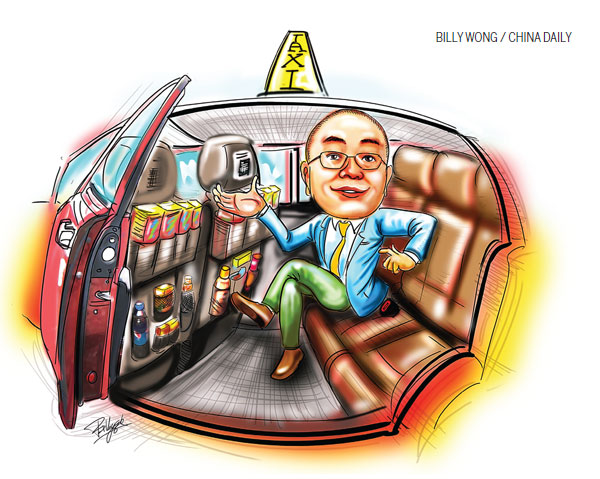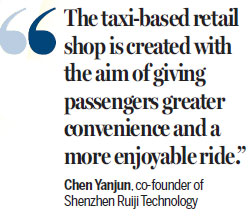New retail puts shops on wheels
Updated: 2018-05-10 07:15
By Zhou Mo in Shenzhen(HK Edition)
|
|||||||
Editor's note: Innovation can take many forms. In this case, while industry giants concentrate on streamlining the "clicks and mortar model" - through unmanned convenience store for example - this one takes the store to where the customer is sitting.
Industry behemoths Alibaba and Tencent are pouring resources into "new retail" - integrating online and offline channels and logistics - but Chen Yanjun believes the meaning of "new retail" also lies in creating new scenarios for retail. And he has illustrated his understanding by bringing convenience stores to cars.
Taxi passengers in Shenzhen may be surprised and excited to find they are hiring a mobile convenience store where they can buy snacks and necessities, and enjoy a shopping experience. Items on offer - ranging from food and drinks to power banks and umbrellas - are in the baskets behind the two front seats.

By scanning a QR code in the car, passengers can enter the store's online version, pick up what they want and pay with their WeChat wallet.
The taxi-based retail shop is created with the aim of giving passengers greater convenience and a more enjoyable ride, while also helping drivers increase revenue, says Chen, co-founder of Shenzhen-based startup Shenzhen Ruiji Technology, which runs the project called Gogo+.
Since the official launch of Gogo+ in May 2016, the service has been running in more than 20 mainland cities, including Shenzhen, Tianjin, Wuhan and Taiyuan. In Shenzhen, hundreds of taxi drivers have enabled the service in their cars.
Some taxi drivers earn 2,000 yuan (HK$2,500) to 3,000 yuan a month through the business, Chen said.

The company has established partnership with several taxi companies in Shenzhen to introduce the project to taxi drivers. It is also in talks with car rental firms and ride-sharing platforms to further promote the business.
Profits mainly come from two aspects, according to Chen. The company is cooperating with a number of brands to source items from their factories at low prices. Then, it sells them to taxi drivers at a higher price.
The price difference is one of the company's profit sources, though Chen stresses that the firm gives its profits to drivers at present to attract more to join in.
Another major earnings channel is advertising in the car-based store and its online site.
In 2016, the company secured 10 million yuan in angel investment. It is near to a new round of financing later this year which is worth tens of millions of yuan, Chen disclosed, without giving the exact number.
Gogo+ is not the only player in the sector that attracts the attention of investors. Mobile Go, another car-based retail service provider, secured 60 million yuan in its A-round financing earlier this year. Its investors include ride-sharing giant Didi Chuxing and leading venture capital firm IDG Capital.
Chen said the idea of car-based convenience stores originated from a trip to Sanya, a popular tourist city on Hainan Island.
"Taxi drivers there usually work busily for the three months leading to the Chinese New Year. When tourists come, they help them look for restaurants, hotels, tourist sites and so forth. Some are able to earn over a million yuan each year through this way," Chen said.
"Local taxi drivers are not just providing transportation service. They are also offering other types of services. That inspired us. Why couldn't we combine transportation with retail?"
The entrepreneurial adventure is far from a smooth sailing, however. The main obstacle lies in the legitimacy of the business.

Food safety law requires that any person running a food-sales business should have approval in advance. Food sales on cars are equivalent to running a business without a license. There is so far no regulation covering car-based convenience stores.
Deng Xiaolin, public-relations director of Shenzhen Retail Business Association, said car-based convenience stores are a new consumption scenario. Any emerging pattern or mode of retail that meets market demand is much anticipated. But it is important to have regulations put in place first, Deng noted.
Some people argue that mini convenience stores would take up space in the already cramped cars, worsening customers' experiences. Others are worried the sales business would distract drivers' attention, increasing safety risks on road.
"Now that physical convenience stores are everywhere and online shopping is so convenient, it is unnecessary to shop on a car, except on rare unexpected circumstances like it suddenly rains and I haven't brought my umbrella with me," said Liu Xinyu, a 31-year-old Shenzhen resident.
Despite these voices, Chen insists car-based convenience stores are born for the future and the business will grow with the advent of driverless cars.
"At a time when autonomous driving is coming, the concept of cars is expected to see changes. In the future, cars will not only serve as a transportation tool, but also play other roles, for example, as a shop, a hotel or a KTV," Chen says.
sally@chinadailyhk.com
(HK Edition 05/10/2018 page14)